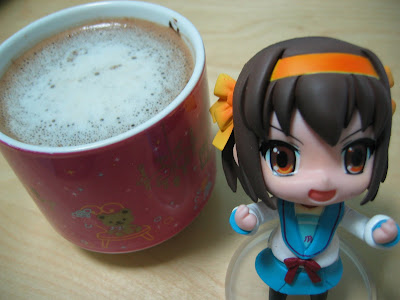Causative and Passive Verbs (Special Expression)
Verbs conjugated into the causative form are used to indicate an action that someone makes happen. Like Captain Picard so succinctly puts it, the causative verb means to "make it so". This verb is usually used in the context of making somebody do something.
食べる 食べさせる
着る 着させる
信じる 信じさせる
寝る 寝させる
起きる 起きさせる
出る 出させる
掛ける 掛けさせる
捨てる 捨てさせる
調べる 調べさせる
source via guidetojapanese.org
Tuesday, May 18, 2010
Monday, May 17, 2010
Lesson 2
Lesson on 3.4.2010
Class on emphasis > Plain form 。。。 のは、~です
The use of のは emphasizes on a subject.
きの Isetan で Chanel のかばんをかいました。
Yesterday, at Isetan, I bought a Chanel bag.
きの Chanel のかばんをかいましたのは Isetan です。
Yesterday, the place where I bought the Chanel bag is at Isetan.
The 2nd sentences introduces the use of のは。
私は 5ねんまい America でえいごをべんきょしました。
5 years ago, I studied English at America
私は America でえいごをべんきょしましたのは 5ねんまい。
The time when I studied English at America was 5 years ago.
ほしのは。。。The thing I want is
したのは。。。The thing I did was
すぎのは。。。The thing I like is
Class on emphasis > Plain form 。。。 のは、~です
The use of のは emphasizes on a subject.
きの Isetan で Chanel のかばんをかいました。
Yesterday, at Isetan, I bought a Chanel bag.
きの Chanel のかばんをかいましたのは Isetan です。
Yesterday, the place where I bought the Chanel bag is at Isetan.
The 2nd sentences introduces the use of のは。
私は 5ねんまい America でえいごをべんきょしました。
5 years ago, I studied English at America
私は America でえいごをべんきょしましたのは 5ねんまい。
The time when I studied English at America was 5 years ago.
ほしのは。。。The thing I want is
したのは。。。The thing I did was
すぎのは。。。The thing I like is
Wednesday, April 7, 2010
Lesson 1
Lesson on 27.03.2010
The teaching of 'want'.
Let's start off with something simple 1st.
I want to eat Sushi.
私はすしがたべたい。
She wants to eat Sushi.
彼女はすしをたべたがっている。
The child has a tendency to want the toy.
こどもは おもちゃ(toy) をほしがる。
The child's desire is to want the toy.
こどもは おもちゃ(toy) をほしがっている。
The teaching of 'want'.
Let's start off with something simple 1st.
I want to eat Sushi.
私はすしがたべたい。
She wants to eat Sushi.
彼女はすしをたべたがっている。
The child has a tendency to want the toy.
こどもは おもちゃ(toy) をほしがる。
The child's desire is to want the toy.
こどもは おもちゃ(toy) をほしがっている。
The seasons
A little reminder for the seasons. I should have picked them up after years of learning, but I did not :(
Spring - はる (春)
Summer - なつ (夏)
Autumn - あき (秋)
Winter - ふゆ (冬)
今は春、さくらのきせつだ!
Spring - はる (春)
Summer - なつ (夏)
Autumn - あき (秋)
Winter - ふゆ (冬)
今は春、さくらのきせつだ!
Sunday, March 21, 2010
目玉焼き (medamayaki) Sunny Side Up
めだまやき - 目玉焼き
This is the word for Sunny Side Up, one of my favorite egg dish :)
目玉焼きがすきです!
Fried, "sunny side up" eggs are a popular breakfast item in Japan. They are often called 目玉焼き (medamayaki), literally 'fried eyeball', supposedly comparing the yolk and white to the iris and the white of an eye. This is usually seasoned at the table with soy sauce or "sosu" (fruity Japanese Worcestershire sauce), or sometimes simply with salt, depending on the preference of the diner.
source via wiki
This is the word for Sunny Side Up, one of my favorite egg dish :)
目玉焼きがすきです!
Fried, "sunny side up" eggs are a popular breakfast item in Japan. They are often called 目玉焼き (medamayaki), literally 'fried eyeball', supposedly comparing the yolk and white to the iris and the white of an eye. This is usually seasoned at the table with soy sauce or "sosu" (fruity Japanese Worcestershire sauce), or sometimes simply with salt, depending on the preference of the diner.
source via wiki
Thursday, March 18, 2010
Using of である
Sentence: 日本語の授業は大変である。しかしおもしろい。
Meaning: The Japanese class is a headache, but it is interesting.
The using of である means that it is a fact. No emotion is involved.
Meaning of the words: -
日本語 - Japanese Language にほんご
授業 - Class じゅぎょう
大変 - Headache/trouble たいへん
おもしろい - Interesting おもしろい
Meaning: The Japanese class is a headache, but it is interesting.
The using of である means that it is a fact. No emotion is involved.
Meaning of the words: -
日本語 - Japanese Language にほんご
授業 - Class じゅぎょう
大変 - Headache/trouble たいへん
おもしろい - Interesting おもしろい
Friday, March 12, 2010
旅行 (りょこう) Holiday
Toto にあたったら、りょこうをいけばいいですよ。
This sentence means that "if we strike lottery, shall we go for a holiday?"- Toto にあたったら >> if we strike lottery
- 旅行 を いけばいいですよ >> shall we go for a holiday?
ば is used in a conditional form because たら (if) is used in front.
Another example would be なくしたら、どうすればいいですよ。 This means (if) something is lost, what should I do?
Thursday, March 4, 2010
疲れた (tsukareta)
眠い /nemui/ means sleepy, and 疲れた /tsukareta/ means (physically) tired
Although not true for all English speakers, a typical thing to say before going to bed is, "I am tired." Along with tired, words like beat, exhausted and worn out are typical after physical exertion.
Although not true for all English speakers, a typical thing to say before going to bed is, "I am tired." Along with tired, words like beat, exhausted and worn out are typical after physical exertion.
In Japanese, 眠い is used when you want/need sleep. In the morning, the word normally used is 眠い、although 疲れた might be used if your body was still worn out despite a night of sleep.
眠たい /nemutai/ has the same meaning as 眠い。
After a work-out or other physical exertion, if you are beat, the word 疲れた is used. In 関西 /kansai/ and other regions, the word しんどい /shindoi/ is more common than 疲れた。
via sourceMonday, March 1, 2010
New Start
Subscribe to:
Comments (Atom)

